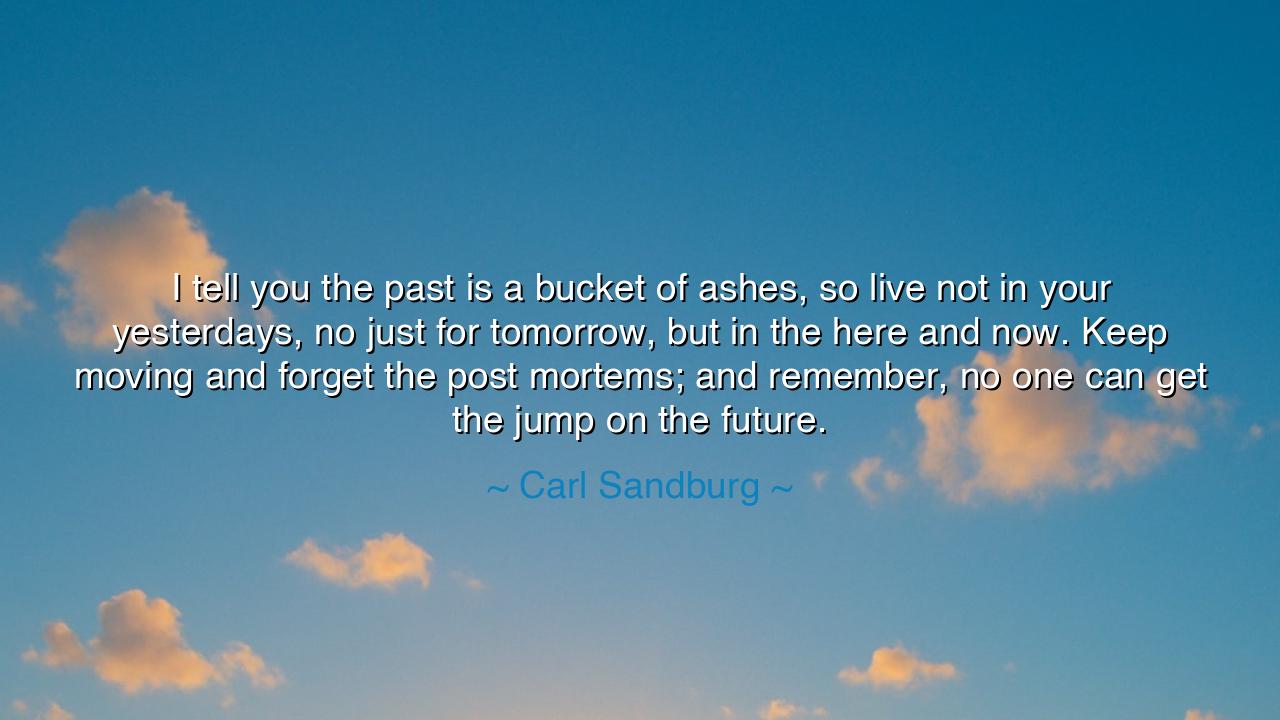
I tell you the past is a bucket of ashes, so live not in your
I tell you the past is a bucket of ashes, so live not in your yesterdays, no just for tomorrow, but in the here and now. Keep moving and forget the post mortems; and remember, no one can get the jump on the future.






In the great flow of time, there are moments when we must confront the weight of the past and the uncertainty of the future. Yet Carl Sandburg, in his timeless wisdom, offers a powerful piece of guidance: "I tell you the past is a bucket of ashes, so live not in your yesterdays, no just for tomorrow, but in the here and now. Keep moving and forget the post mortems; and remember, no one can get the jump on the future." These words are a reminder that while the past holds lessons and the future possibilities, it is the present moment—the here and now—that we must truly inhabit if we are to live fully. The ashes of the past, though valuable in their lessons, are no place to dwell; the future, though inviting, is a land we cannot rush toward without first embracing the moment at hand.
The ancients understood well the tension between past, present, and future. In Greek philosophy, the idea of time was often discussed as something fluid—something to be contemplated but not clung to. The Stoics, for instance, taught that one must live in harmony with nature and time, which meant accepting the past as it is, neither mourning nor regretting it, and facing the present with purpose. Epictetus, a Stoic philosopher, often reminded his followers that only the present moment was in their control, urging them not to be slaves to past regrets or future anxieties. Sandburg’s words echo this Stoic wisdom: we must learn to move forward and live in the now, for it is in the present that we truly possess the power to shape our destiny.
Consider the story of Alexander the Great, who, though an extraordinary conqueror, also struggled with the weight of his past. After conquering much of the known world, Alexander often found himself searching for meaning in the lands he had already claimed. His past victories, though glorious, were not enough to satisfy him. But it was in the moment, in the challenges of each new battle, that Alexander found his greatest purpose. The future, with all its promise, seemed ever just out of reach. Thus, his quest was never truly about the past, nor the future, but about the next step—the present moment in which he could define his greatness.
Similarly, Mahatma Gandhi embodies Sandburg’s philosophy in his fight for Indian independence. Gandhi’s life was a testament to the power of the present moment. Though the past of India was marred by colonial oppression, and the future was uncertain, Gandhi’s unwavering focus was on the now—on nonviolent resistance, on truth, and on peace. He lived with an understanding that the future could only be shaped by the actions we took today, and he refused to dwell on past wounds or future uncertainties. His ability to remain grounded in the present empowered him to lead an entire nation toward independence.
Sandburg’s message is a call to action—to embrace the present and move forward. When we dwell on the past, we become mired in regret, and when we focus solely on the future, we risk missing the opportunities in front of us. This is a concept that has echoed throughout history: live in the moment, for it is in the present that you can make the most meaningful impact. The past is gone, and the future is always out of reach, but today—the present—is where life truly happens.
The lesson here is one of balance and clarity. Sandburg urges us not to be trapped by the ashes of the past nor to live in fantasy of an unknown future. Instead, we must seize the present moment, for in doing so, we find freedom. “Keep moving,” he advises, for stagnation—whether due to past mistakes or future worries—only holds us back. Progress is made one step at a time, and that step is always in the here and now.
In your own life, consider where you may be living in the past or overly focused on what is to come. Reflect on how you can become more present—whether in your relationships, work, or personal pursuits. What is one action you can take today that will bring you closer to your goals? Let go of the regrets of yesterday and the uncertainties of tomorrow, and focus your energy on making the most of the now. Just as the Stoics, Alexander, and Gandhi understood, true power lies in living fully in the moment, for it is only in this space that we can truly create the future we desire.






AAdministratorAdministrator
Welcome, honored guests. Please leave a comment, we will respond soon